#she's just a very interestingly written character
Text

anita thee vampire
#speakerphone!#VERY proud of this#also shes got purple eyes bc in our dnd campaign the man who created vampires had purple eyes. so.#shes technicallu just a side character for my other character silan#but shes very important to me and silan. so i wanted to draw her.#interestingly enough. i have not written her backstory.#but i have written the story of another vampire silan killed (bronislawa) and im working on another (maria)#anyways heeeeeeeeres anita 💚
15 notes
·
View notes
Text
Japanese Linguistic Observations in Spy x Family - part 2
Part 2 - Anya's "Anya-isms"
I think Anya has one of the most interesting ways of speaking out of all the SxF characters. But like with Twilight's dialogue that I previously discussed, it can only be fully appreciated in the Japanese version. Probably the most noticeable thing about her dialogue is how it's written compared to the other characters.
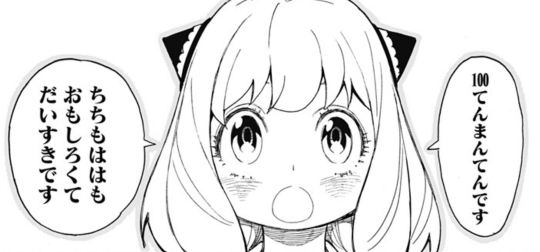
Written Japanese is comprised of three different alphabets: ひらがな (hiragana) and カタカナ (katakana), which together are referred to as "kana," and 漢字 (kanji). Kanji are the characters that hold the meaning of words, while kana simply represent the various Japanese syllable sounds and don't have any meaning on their own (much like the letters of the English alphabet). There are only about 100-ish total unique kana symbols, however, there are over 2,000 kanji in common use today. So Japanese children will start out learning kana and then learn kanji gradually during their school years. This is why Japanese children's books are typically written only or mostly in kana. This is also why manga and books aimed at a younger audience will have kana "translations" of kanji written above kanji characters, which are called furigana.
With that in mind, it's not surprising that all of Anya's dialogue in the Japanese version of the SxF manga is written entirely in kana. Even though using kanji in her dialogue wouldn't necessarily mean she knows kanji, reading a character's dialogue only in kana definitely gives off childish vibes – it conveys feelings of youthfulness and innocence, like "they're speaking only in kana because they don't know the kanji for these words…they're just a little kid, after all." At least, that's the feeling I get when I read Anya's dialogue. Though I haven't read enough manga in Japanese to say for sure, it seems like this concept of making little kids speak only in kana is not unusual, as there's at least one other example I know of: a manga from the mid-2000s called Yotsuba also has a titular 5-year old whose dialogue is written only in kana.
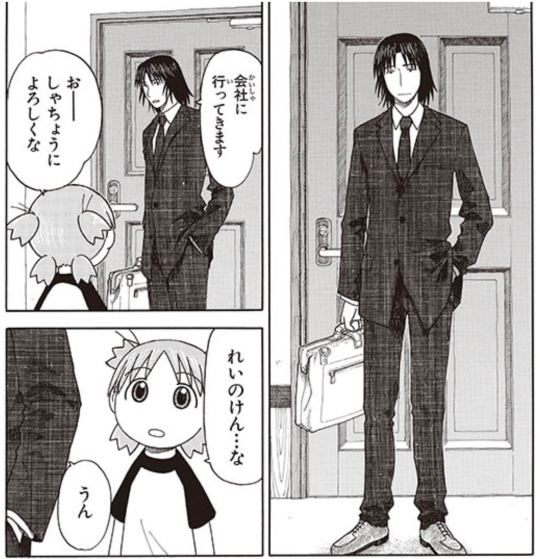
What's also interesting is that all of the other Eden kids speak "normally," using kana and kanji properly in their dialogue. This helps to convey the fact that, despite Anya being roughly the same age as them, their "rich family" upbringing has forced them to grow up faster. In the below panel, you can see how Damian's dialogue uses kanji (with furigana translations) while Anya's uses only kana, even for words that have kanji.
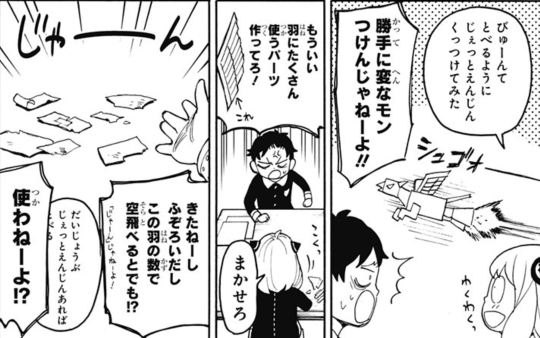
Interestingly, I found at least two cases where Anya does use kanji in her dialogue: when she's calling out the name of her big "Arrow of Light, Seize the Star" move during the dodgeball game, and when she calls out her "Lighting Bolt, Deliver my Aid" move when she tries to throw Yor's weapon back on the deck in the cruise arc. As you can see in the below panels, the names of these "moves" is written in kanji (with furigana translations). This makes sense not only because this is parodying shonen series where the characters shout out the names of their moves, but because it emphasizes how determined Anya was at these moments.
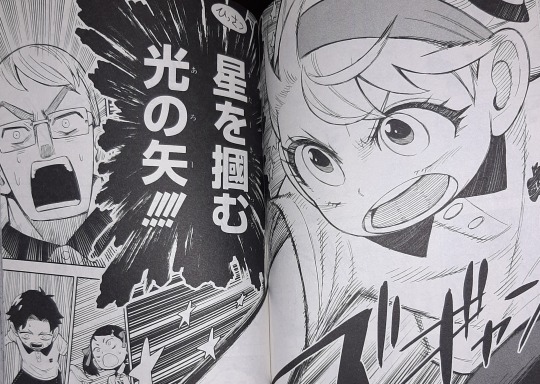
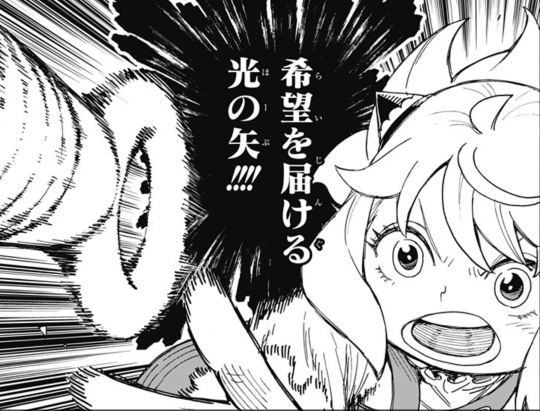
But going back to how Anya's speech compares to the other kids, another thing that stands out is that she speaks very "plainly." Her grammar is (mostly) correct, except for a few mistakes you'd expect a little kid to make. But she uses pretty much no colloquialisms, almost as if she knows the language but lacks the experience for using it in normal social interactions. I don't think this is unusual for a kid her age who's still learning, but it definitely stands out when compared to her classmates. For example, in the below panel, Becky uses normal interjections and other colloquialisms in her speech, like "ne" (ね), "wa" (わ), and "yo" (よ), which are all standard Japanese linguistic devices for softening or emphasizing your sentences. However, Anya doesn't use things like this in her speech. Again, this makes her speech come off as very plain and abrupt, almost like she's not a native speaker.
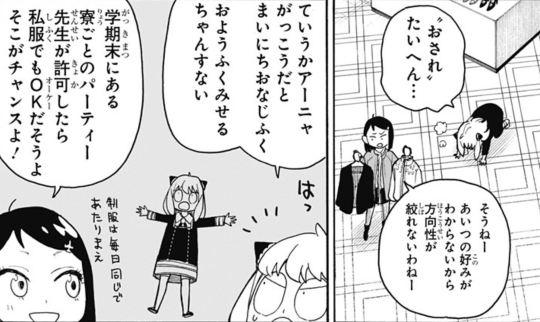
She also refers to herself in third person all the time in the Japanese version. In fact, I don't recall her ever using an "I" or "me" pronoun. I don't know why the English version of the manga doesn't keep this characteristic of her speech. I think it's very important in highlighting the childish aspect of her personality.
Putting all this together – the fact that she doesn't use typical colloquial speech and refers to herself in third person – really emphasizes the childish, naive, and almost baby-like nature of her character. I'm curious if Endo made her speak this way simply to show what a little kid she is compared to her classmates, or if it will somehow tie back to whatever roots she has in classical languages that he keeps hinting at. Regardless, as I mentioned in my full Anya analysis, what she lacks in speech and school smarts, she makes up for in empathy and resourcefulness.
Besides all this, Anya does make typical speech mistakes a normal kid would make, like mishearing words or saying things wrong. She mostly uses casual speech, but does try to use keigo (polite speech) on occasion, though not always correctly. For example, she says "ohayaimasu" (おはやいます) for "good morning" instead of "ohaiyou gozaimasu" (おはようございます).
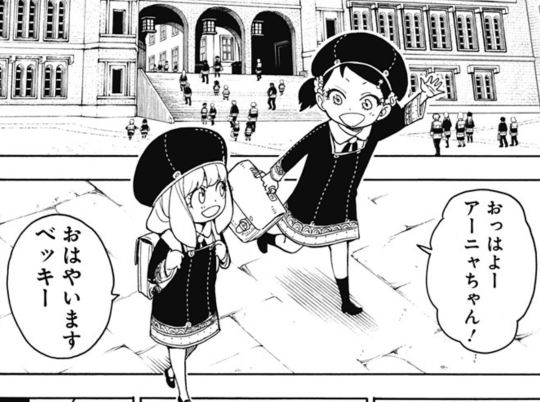
But the most consistent "mistake" she makes (though it's not really a mistake) is what she calls Loid and Yor – "chichi" (ちち) and "haha" (��は) respectively.
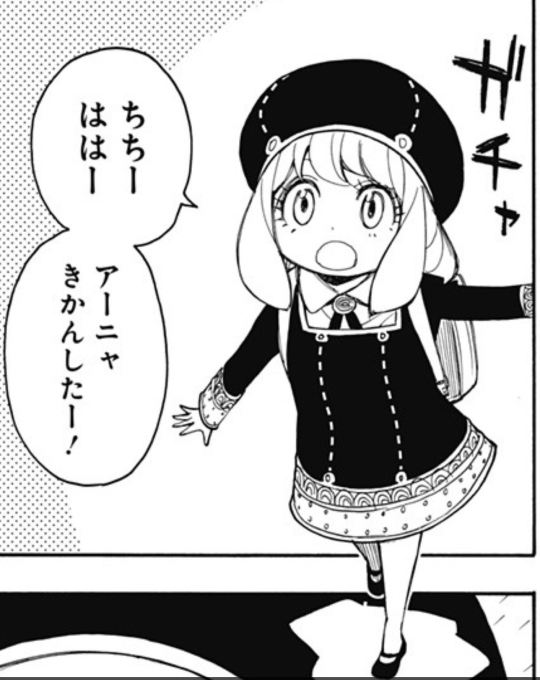
Japanese has many different words for relatives depending on whether you're talking about your own relatives or someone else's, and whether you're talking to them or about them. "Chichi" and "haha" are the general, neutral terms for "father" and "mother," and are also used when talking about your parents to someone else. However, they're not used when talking directly to your mother and father. There are many other words for that, the usual ones being "o-tou-san" (お父さん) and "o-kaa-san" (お母さん), or some variations of these with different honorifics. Damian refers to his dad as "chichi-ue" (父上) which is very formal, while Becky calls her dad the actual English word "papa" (パパ) which is very informal and normal for kids to use. But again, "chichi" and "haha" are typically only used when talking about your parents, not to them the way Anya uses them. This started from the very first chapter where Loid asks her to call him something that sounds "elite." He originally suggests the very formal "o-tou-sama" (お父さま), but when Anya says "chichi," he doesn't bother to correct her.
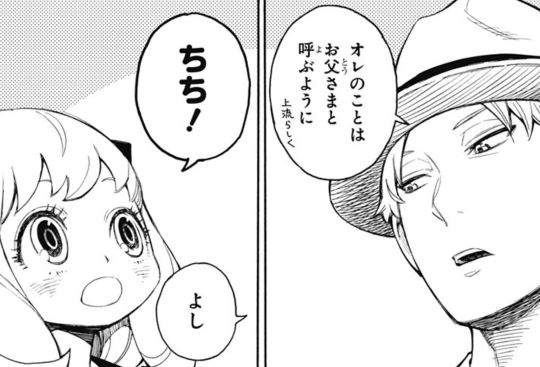
Hearing a little kid call her dad and mom "chichi" and "haha" is kind of like calling them "my father" and "my mother" even when speaking to them directly – it's not wrong necessarily, just strange. But again, this serves to further emphasize the childlike nature of Anya's character.
<- Return to Part 1
Continue to Part 3 ->
572 notes
·
View notes
Text
I've seen some people express some confusion about what Fortnight is about, why it opens the album, what's happening in the video, etc, so here's my attempt at an analysis. For the most part I'll be referring to the characters in the video with the names of the people playing them (Taylor and Post) but at times I'm going to be making direct reference to the events of Taylor's personal life and referring to the muses by their names (Joe and Matty) for the sake of clarity and simplicity.
The song itself uses the suburbia conceit as an extended metaphor for the beginning of her relationship with Matty (he's the neighbor she runs away to Florida with, Joe is the cheating husband.) For more eloquent and detailed thoughts on the narrative of the song you can check out Jaime @cages-boxes-hunters-foxes's post here.
The video is really dense, and I'm not 100% confident in every aspect of my interpretation, but I feel pretty sure that it's making extensive use of visual metaphor in order to tell roughly the same story as the song, just in a different setting. To start, Taylor wakes up chained to a bed in a white dress.

To me this suggests that she's been driven mad by being left at the altar, and is now trapped, surveilled and controlled, in a type of asylum. This represents the end of her relationship with Joe--waiting for a marriage that never came, feeling trapped, mentally unwell etc.
She then takes 'forget him' pills which reveal Post's tattoos on her face when she looks in the mirror.


This represents Matty (the "miracle move-on drug") and shows that he made a mark on her while she was still in the asylum--that is, still in her relationship with Joe. Additionally, in the wide shot where we see the mirror, its size and shape are very reminiscent of a one-way mirror, often seen in interrogation rooms and psychological experiments, further reinforcing the idea that Taylor is imprisoned here.
She then is able to go to the typewriter room and do her work, creating art about how she's feeling, shown by her repeatedly typing "I love you, it's ruining my life" on the typewriter. She's still in pain and feeling trapped. While there, she encounters Post and they create art together, which creates beauty and color in her life. The blue and gold obviously reference her writing about Joe, but the fact that her work is gold and Post's is blue may be a deliberate choice to draw parallels between Matty and Joe, as she does on numerous songs throughout TTPD.
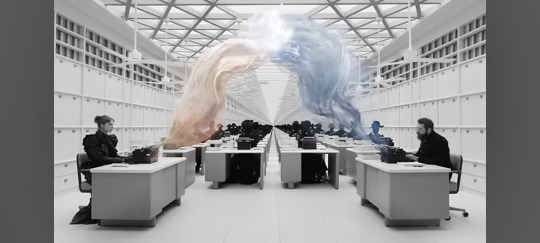
The next scene, where Taylor's hair is down and she and Post are wearing the same black coat and pants, takes place inside her head (symbolized by the shape of the papers they're laying on.) She is dreaming about them being free and creating art together, represented by the papers surrounding them and book she's holding, which has the word "us" written on the cover. She's writing their story before it's begun.
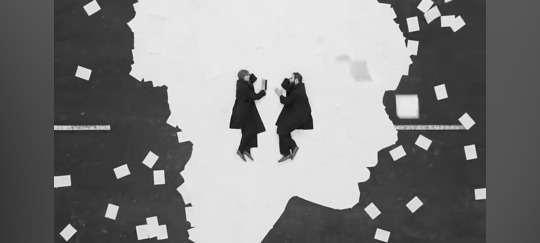
She then reaches for his hand in her fantasy, accepting and asking for this relationship
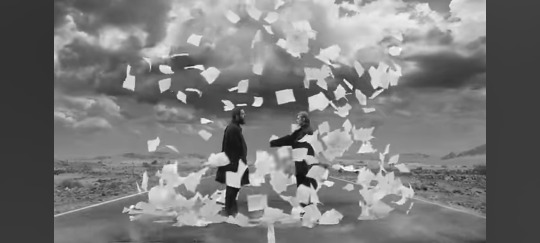
Then we see that she's being studied and experimented on--the results of the lie detector test read "I love you, it's ruining my life." Her pain is an object of fascination.

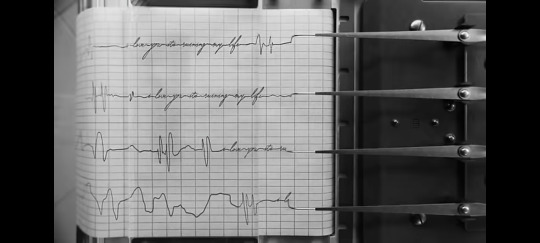
Interestingly, Post is part of the group experimenting on her, but when the experiments begin to cause her pain, he liberates her.

This inspires Taylor to destroy the place where she's been trapped, which we see through her opening the filing cabinets that cover the walls and destroying the mirror. I also find the shot of her standing still while papers burn around her interesting and significant; I interpret this as Taylor destroying her own work about Joe. By choosing to leave, she is metaphorically burning--rejecting--the story she wrote about them.
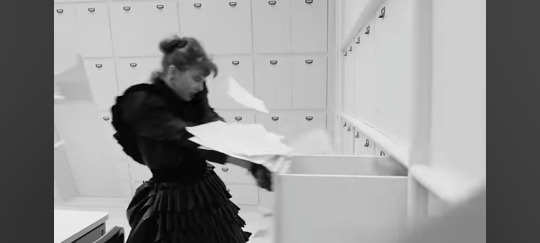

Finally, Taylor and Post enter the dangerous outside world together; the rain echoes the lyric "I chose this cyclone with you" on the album's title track. While I do feel the meaning of Post being in the phone booth is somewhat ambiguous, the framing and the accompanying lyric--"I've been calling ya but you won't pick up" suggest that he's attempting to communicate with her but can't reach her. They are free of her prison, but still separated.
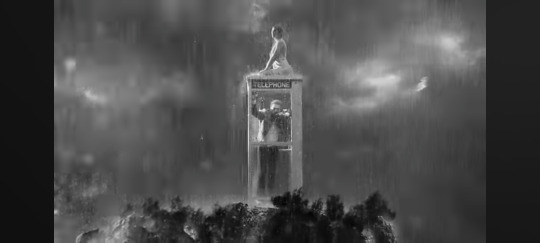
Then, he hangs up the phone and reaches for her hand, and she takes it. The final shot of the video is a close up on their linked hands, presenting us with a cautiously optimistic ending--they are lost and vulnerable in the middle of a storm, but they have each other.
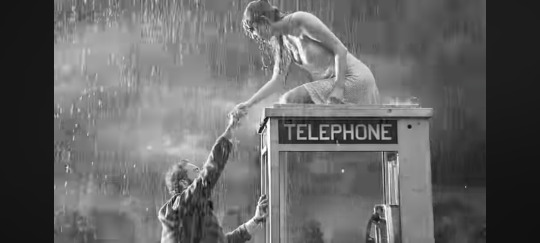
I feel this is a somewhat less sinister, for lack of a better word, portrayal of the start of Matty and Taylor's relationship than is suggested elsewhere on the record, though I believe Post's character being part of the group experimenting on her is significant and the editing creates some ambiguity about exactly when and why she decides to break free. But I hope this clarifies how the video sets up the beginning of this story, the fallout of which is then chronicled over the course of the rest of TTPD.
238 notes
·
View notes
Text
“Bad Representation” is actually a topic I’m really passionate about and interested in, I could talk about it for ages. The way people handle “Bad Representation” as a concept is genuinely fascinating, too, so this is both an analytical fascination and an anthropological one.
For clarity, I thoroughly do believe there is such thing as “Bad Representation”, especially when it comes to expressions of pure bigotry from the person doing the representing… But I personally think everyone’s bar for what counts as “Bad Representation” is set a little bit too strictly, has no real account for capitalistic and/or historical restrictions - For Example: Language and common understanding of queer identity being far different in the 1950’s than it is now, and Studio Meddling - and also, interestingly, tends to take no account for the opinion of those getting “represented”, or the idea of individual satisfaction.
There’s been many, many times where a character is objectively pretty bad representation by modern standards, but discussion surrounding it takes no account for the concept of Resonance. Sometimes a character is not “Good Representation” as an objective concept, but they are relatable, likable, and quite fun to watch. I’ve seen quite a few instances of people talking down to the mentally ill or disabled for enjoying a Slasher in part because of their disorder/disability, or queer people for enjoying Hays Code villains. Sometimes a character isn’t written kindly, or isn’t written well, but they really resonate with you… And that counts for something.
One of my favorite characters - one who has helped me come to terms with my cPTSD and OSDD - is a representation of PTSD + DID that is objectively not very good. He’s basically a Vietnam War veteran, who gets an Alter in the middle of the war that is basically a self defensive Murder Mode. It’s literally the PTSD from The War and Evil Alter cliche, but there’s just some aspects that really hit for me, like the fact that he’s considered the nicest, kindest person in the cast, and the alter is portrayed clearly as being in constant self defense mode, thinking he’s still in the middle of the war, and also being quite silly. There’s several details I view as being done pretty well, a whole arc about him grappling with his mental health in a way I find quite fascinating and visceral, and I enjoy him quite a lot! But many would agree that he’s “Bad Representation” because of the War PTSD and Evil Alter tropes. Even I agree that those things kinda suck, but that’s not stopping the fact that this character has meant a lot to me, and that I really would not be the same level of okay with myself if I hadn’t discovered this character.
I’ve caught flack for this. I’ve seen many other people latch onto a character who is not executed very well because they find them personally relatable, or are using them to figure some things out about themselves, and also catch flack for it because the character is not “Good Representation” for a group as a whole. No account for Resonance, no account for Individual Experience. It’s a fascinating lack of a sense of nuance.
I think people have forgotten - or perhaps do not realize - that criticizing a base concept, or base execution of a concept, is different from criticizing individual experience. It’s like the difference between criticizing the makeup industry vs. criticizing someone’s personal choice to wear makeup. It is good to point out when something is written or executed poorly, but you do not know the reason why that one individual disabled person enjoys a poorly written character who shares their disability. I would even say that they probably know more than you do that it’s written badly, because they have lived that character’s disability and you likely have not. I think you should maybe step off if a blind person really likes Terezi or something. You do not need to patronize them by telling them that she isn’t “Good Representation” because her quirk isn’t screenreader friendly, and that her blindness has a magical workaround. I think they already know that these are facts about her that are true. They like her for a reason, and that reason is Resonance.
#homestuck#media analysis#disability#representation#bad representation#good representation#nekro.pdf#nekro.txt
97 notes
·
View notes
Text
Deltarune Prediction: Possible upcoming members of the Fun Gang in future chapters
The files of deltarune have two specific naming schemes for dialogue portaits.
If the character is a member of the main cast (Which I'm defining as any major ally who visits a dark world), their dialogue portraits are labeled "spr_face_[character's first initial]". For example, all of Susie's dialogue portraits are labeled "spr_face_s", all of Noelle's are labeled "spr_face_n", and all of Ralsei's are labeled "spr_face_r".








The other characters who follow this pattern are Lancer, Berdly, and Toriel (Who will presumably be very important in chapter 3).
For other characters, full names tend to be used. Asgore's portraits are labeled "spr_face_asgore", Burgerpants' are "spr_face_burgerpants", Sans' are "spr_face_sans", etc.
It's worth mentioning that despite being very important to the story, characters like King and Queen who are primarily antagonists fall into this category. It's not necessarily an indicator of importance, but rather seems to be one of whether the character is a part of the Fun Gang (the group as a whole, not just the playable Fun Gang characters).
There are three characters who seem to break this scheme. Jockington interestingly doesn't fall into either category, having his portraits abbreviated as "spr_face_jock". He's the one character to have an only-partially abbreviated name. You could pass it off as Toby simply shortening a long name, but Burgerpants' name is even longer and that's written out in full. Whether this means he'll have a major role in future chapters is unclear.

More significantly, Catti (not Catty) has dialogue portaits labeled "spr_face_c". Other than Toriel, who will definitely have a big role in chapter 3, Catti is the ONLY up-until-now-side-character with just her first initial used in the portrait naming. This is pretty damning evidence that she'll be a main character in the future.

It's worth noting that in Susie's chapter 1 sprites her eyes are covered by her hair. Jockington's eyes are similarly covered by sunglasses, and while Catti's aren't hidden, she does have pretty intense eyeliner. It might not mean anything, but all of the major characters with the exception of Noelle seem to have a pretty consistent "eye" theme. (Even with Noelle, you could argue that her eyes going blank while she uses Snowgrave and the shadows cast over them after using it fits.)
The third character is honestly kind of a long shot, but it's important to point out. I'm sure most of you have seen this unused MS Paint Ralsei portrait:
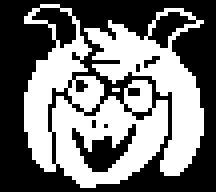
What many of you might not know is that it actually isn't labeled like the other ralsei sprites. The filename is "spr_smallface_a2".
"a". not "r".
This goddamn image might be our first look at deltarune universe Asriel.
The fact that its "a2" implies that there were two other "smallface" Asriel portraits that were for whatever reason removed from the files.
Full Character Categorization
Current/Future Fun Gang Members (first initial used)
Susie (spr_face_s)
Ralsei (spr_face_r)
Lancer (spr_face_l)
Noelle (spr_face_n)
Berdly (spr_face_b)
Toriel (spr_face_t)
Catti (spr_face_c)
Asriel (spr_smallface_a)
Other Characters (first names)
Sans (spr_face_sans)
Asgore (spr_face_asgore)
Catty (spr_face_catty)
Bratty (spr_face_bratty)
Burgerpants (spr_face_burgerpants)
Rouxls Kaard (spr_face_rurus) - "rurus" is the Japanese translation of his first name.
Undyne (spr_face_undyne)
Rudy (spr_face_rudy_ch1) - Interestingly, Rudy is the only character who doesn't have non-ch1 sprites. Even Catti, who doesn't have any actual new sprites between chapter 1 and 2, has two duplicate sets of files (spr_face_c_ch1 and spr_face_c). It's almost definitely just a tiny little oversight, but I may as well mention it.
King (spr_face_king)
Queen (spr_face_queen)
Alphys (spr_alphysface) - weird break in naming pattern but still not abbreviated
Jockington
Jockington (spr_face_jock)
Final Comments
Please let me know if I missed anything. Also keep in mind this is all very much a theory, and kind of a questionable one at that. While I'm personally pretty convinced about Catti in particular, it's all kind of up in the air—I just noticed an interesting pattern and wanted to share it.
#deltarune theory#deltarune#toby fox#catti deltarune#jockington#asriel#sorry this is so long#i hope this isn't just my deltarune brainrot taking over and this all actually means something???? maybe????#this goddamn game is the only thing keeping me going istg
292 notes
·
View notes
Text
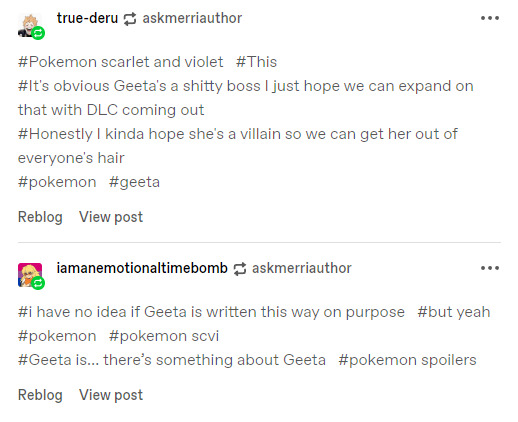
Regarding this post I made earlier examining Geeta's antics in Paldea.
In Defense of Geeta
I feel like Geeta absolutely was written to be the shitty boss she is intentionally. There's too many situations where attention is drawn to her bad habits, either as them being directly pointed out or indirectly referenced. But what I really hope the case ends up being is that she's not at all a villain. Pokemon has gone the route of the suspicious CEO-type character being the "twist villain nobody could have seen coming!" for several games now. It's getting pretty old and I feel like it would be a weak direction for S/V to take.
Interestingly enough, one actually can look at all of Geeta's actions and not really see anything nefarious about them. Discussion after the jump for the sake of spoilers and wall'o'text.
It's very easy to look at Geeta and think she's a Bad Guy, given her strange behavior and all the negative attention she gets among the fandom. I'm certainly not innocent of seeing her in a less than endearing light, given my prior post. But a lot of that view does come from real world parallels and comparing the game's presentation to past Pokemon games in which nobody ever says the slightest criticism of the Champion, which may not necessarily be fair.
One of the biggest justifications Players have to indicate Geeta is bad is the way she meddles with the Gym Leaders and how corporate she's made the League. I pointed that out myself. But to flip it around... maybe she behaves that way because it's what the Gym Leaders need?
We constantly see Geeta inserting herself into events throughout the game. She shows up at the Academy, pops up at Gyms seemingly at random, and is always talking about how she has other pressing business that pulls her away from lingering too long. The only way she gets time to participate in casual encounters is when others (usually Nemona or the Player, if not both) take some of her workload off her plate. While I criticized the way Geeta had apparently deeply intertwined the Pokemon League, the Academy, and the Paldean economy itself, it does stand to reason doing so puts a ton of work on her having to maintain it. That's her own doing though, so it's a case of her getting what she signed up for and she never seems to shy away from it despite her habit of recruiting others to help.
The Gym Leaders, though? While they do remark about Geeta meddling with them, giving frequent reviews, and otherwise sticking her nose into their business, they've also shown that they're all pretty flaky. Rather, they're a total mess both individually and collectively. It's possible that the reason Geeta is constantly keeping an eye on them is because they need that in order to fit the direction Geeta is trying to guide the League in.
When we meet each of the Gym Leaders both in our first encounter and in the rematch post-game, we learn a lot about their behaviors through casual exposure. All of the Gym Leaders have a job besides running a Gym and, with the exception of Grusha, all of them show that running the Gym is by no means their top priority. Nor are any of them especially reliable when it comes to managing their Gyms. Based on past games, we're accustomed to Gym Leaders taking a large amount of pride in their position and holding it in esteem even when they also had other simultaneous jobs. We've seen Gym Leaders and Elite Four who were also artists, performers, athletes, CEOs, and such before. That's not the case with Paldea though; to these Gym Leaders, it's just a job and not necessarily one they put a lot of personal investment into compared to their actual passions/careers. It's mentioned that Geeta "strong-armed them" into taking on the role, which can be read that she went out of her way to convince strong, capable Trainers to become Gym Leaders for the sake of Paldea and because she saw the potential they held but weren't utilizing.
Katy flat-out forgot that she was under review and only appeared for the rematch by pure coincidence because she just so happened to visit that day. When we first meet Kofu, he and his assistant are both a totally scatterbrained mess. Iono only bothers with being a Gym Leader because it gets her viewership for her streamer career; if something else better came along, she'd surely jump for it immediately. Brassius is very upfront about his artistic passions being the number one thing in his life and openly abandons his responsibilities as a Gym Leader to pursue them during the rematch. Tulip's modeling career keeps her busy and she only has just enough time to show up for a brief match before immediately leaving to get back to her work. Ryme is more focused on her music career and wasn't even the original Gym Leader; that position belonged to her sister, Professor Tyme, who left the role to become a teacher. Larry, despite being the most vocal about his dislike of Geeta's habits, is also the most distracted as he has three simultaneous jobs and constantly works overtime. Finally, Grusha doesn't have any job besides being a Gym Leader, but that's only due to an injury that has made it impossible for him to pursue his original passion. That same injury has likewise cost him his motivation and drive to improve; he's only hanging onto his role as Gym Leader because he doesn't think he has anything else going for him now.
With all that in mind, it makes sense a rigid sort like Geeta would want to keep a close watch and short leash on all these unreliable personalities, doesn't it? She has to keep tabs on them because they risk failing the various Trainers who hope to challenge them otherwise, along with squandering their own potential. Geeta is always very open about her desire to foster powerful Trainers out of Paldea, if nothing else. After the rematch, all the Gym Leaders express a level of understanding and even appreciation toward Geeta for what she's done for them. Grusha and Larry stand out in particular, as they both confess that her meddling has helped motivate them to go beyond what they've settled into. Where Larry mentions that Geeta will dock his pay if he wastes time, he also mentions that she insists he stop overworking himself with overtime hours. So it's possible she's simultaneously trying to keep him focused without letting him overdo it as well.
When it comes to how corporate Geeta has made the League, that's not technically fair to say either. It's an easy shorthand but not entirely accurate. The goal of corporations is to make profit no matter what, but that's not really Geeta's motivation. She's not looking to get rich or powerful, but to rally as many genuinely powerful and talented Trainers up within Paldea as she can. That, in and of itself, isn't at all a bad thing and is commonly shared among all regions that have a League. While I criticize League Points as being company scrip, it does supply not just Trainers but all citizens of Paldea with an alternative way of funding themselves. This would include the Gym Leaders; despite common remarks (which I have made myself) about Geeta not paying the Gym Leaders a living wage, it's entirely possible they do indeed make plenty to thrive on and just have their non-Gym Leader job because that's their true passion that they want to put their effort into. Be it cash or League Points, they do have a salary. Larry himself mentions it outright, while Grusha and Brassius don't seem to be in any financial straits despite their unstable working conditions outside the Gyms. When it comes to the region's economy as a whole, subsidizing major commercial chains throughout the region just to make food and supplies more accessible can't be cheap; when you sell goods to the PokeMart for cash, you only get a fraction of the total value, but get significantly more (usually double) the value in League Points. Geeta's overall emphasis doesn't seem to be shaping the League and its sphere of influence within Paldea to make herself wealthy or powerful, but rather to make the whole affair as plainly efficient and self-sustaining as possible. In that regard, she's done a fantastic job.
When all is said and done, I genuinely hope Geeta isn't a villain but simply a boss with lofty visions, exacting demands, and absolutely terrible interpersonal skills. I feel like she'd be a lot more interesting that way in that she'd be a genuinely flawed person without her issues just being dismissed as "because she's the Bad Guy".
#pokemon#pokemon scarlet and violet#pokemon sv#pokemon geeta#pokemon larry#pokemon grusha#but seriously - where the hell are Poppy's parents? What's the deal? I NEED ANSWERS#Geeta ruins everything but maybe not#I'm down for Socially Inept Disaster Boss Geeta#Why are you Gym Leaders not being productive and happy? I specifically requested it.
568 notes
·
View notes
Text
The Gospel Of Elphaba
In May 1900, the George M. Hill Company published The Wonderful Wizard Of Oz, a book written by L. Frank Baum and illustrated by W. W. Denslow. That book captured the imagination of its audience enough to get sequels and one of the most dangerous film adaptations to make of all time.
The book was about good and evil, and featured a stereotypical medicine journey about a child trying to return home. It discussed personal growth and childhood fantasy and is generally a good book, even with the elements that haven't aged as well (again, it was published in 1900).
But then, in 1995, Gregory Maguire wrote Wicked: The Life and Times of the Wicked Witch of the West, a fanfiction that takes a very different approach on the story. This book discusses the same themes, but from a different angle. Now things are complicated.
Enter Wicked, the musical, which dissects the themes even further, and uses its opening song, No One Mourns The Wicked to tear apart the idea of good and evil in the original book.
Let me explain.
SPOILERS AHEAD
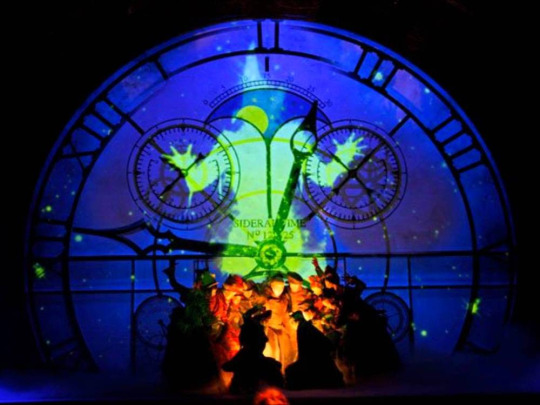
I wasn't joking in the title of this post. No One Mourns The Wicked (NOMtW) and the musical as a whole do act as a gospel. Which is fascinating.
Now, I am not Christian, but I do have experience with the faith from a scholarly perspective and from growing up in a heavily Christian culture. As such, while I will treat the faith with the respect befitting any living religion, my perspective on it is that of an outsider looking in, so I cannot be considered a definitive source on Christianity.
The word "Gospel" comes from a few different sources, most notably "godspell" according to etymonline.com, which means "good spell" or "good message" or, if you really stretch the thesaurus, "good news."
The gospel of mark literally opens with "the beginning of the gospel of Jesus..." (English Standard Version) or "the beginning of the good news about Jesus..." (New International Version). So, the word is interchangeable.
And would you look at that, the opening words of NOMtW are:
"Good news, she's dead".
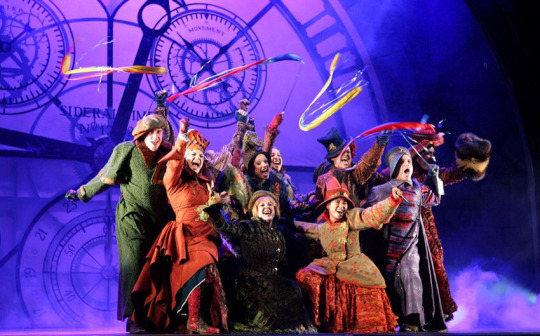
The song is deliberately drawing comparison between Elphaba and the Biblical Messiah, specifically with the defining act. Jesus' most famous act was his death, and the same is true for Elphaba. But both characters have more to their story than the surface level ideal, notably their perspective that people should be kind to each other, and that was why they were "killed". Also, neither of the two stay dead for very long.
But there is more to the similarity than just some neat little references, specifically in how they differ. And that might be contradictory, but it really isn't. Opposites are similar in how they relate specifically to each other. A thing can only be the opposite of something else, it can't be the opposite on its own.
NOMtW actively asks the question: "Was it actually good news?" Specifically in relation to Elphaba. Wicked is told from the perspective of Elphaba, and it frames her death as a tragedy. So NOMtW gives the audience the setup for that story.
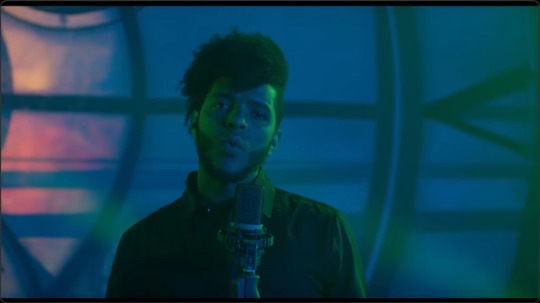
"No one mourns the wicked!"
"No one cries they won't return!"
"No one lays a lily on their grave!"
Voiceplay has a phenomenal A cappella Medley for the Wicked musical that I highly recommend you check out.
These lines serve to build into the tragedy itself, they make you feel sad for the deceased person. But the anger with which they are said gives a different vibe. Suddenly, these become warnings, don't be wicked or else.
Fun fact: I was in a high school production of this musical, as a chorus member, and I was given the line about the lily. The director told to deliver the line as a threat to the audience, which reframes the meaning a bit, doesn't it? The chorus is telling you not to empathise with the Wicked Witch of the West.
And interestingly, that's who she is in this song. The name "Elphaba" isn't mentioned once. She is the Wicked Witch. That's who the audience thinks she is, and that's who the chorus thinks she is. The citizens of oz become the audience surrogates.
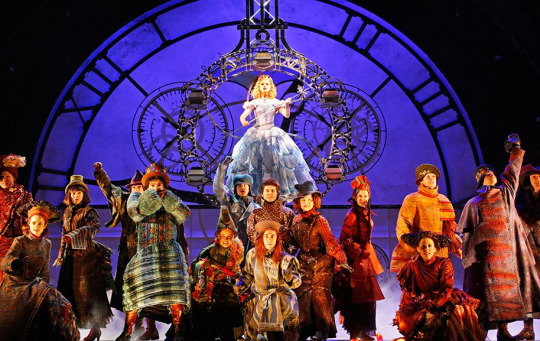
Glinda, the good witch, then begins to argue with the chorus. Her melodic voice contrasts with the spite of the Ozians, and that translates into her lyrics.
The conflict here is to confuse the audience, I think. It is to ask them who they think they should be agreeing with here. And when the chorus echos Glinda's words, they change them. Those last three lines become:
"And goodness knows,
the Wicked's lives are lonely.
Goodness knows,
The Wicked die alone.
It just shows when you're Wicked,
You're left only
On your own."
What is truth in this world? Can even that be trusted? That's what the musical as a whole seeks to answer, as well as what consequences that has on the real world.
"Nothing grows for the Wicked
They reap only
What they've sown"

"Are people born Wicked? Or do they have wickedness thrust upon them? After all, she had a father. She had a mother, as so many do"
I have put some of the above quote in bold, and that is because it is a fantastic question to ask in a story about good and evil. In the original book and subsequent film, the Wicked Witch of the West is evil because she does evil things. She tries to kill Dorothy on multiple occasions, so she is evil, right?
Here, Glinda asks a simple question: "Why did the witch do that?" And this part of the song becomes spoken instead of sung, to really emphasise the point.
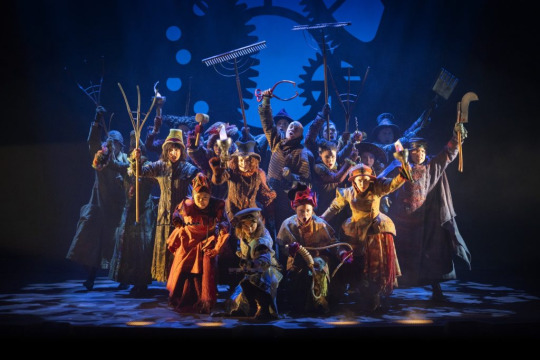
But Glinda also tries to humanise Elphaba here, she had a mother and a father. This reminds me of another humanising moment, but not from the bible this time.
"Hath not a Jew eyes? hath not a Jew hands, organs, dimensions, senses, affections, passions? ... If you prick us, do we not bleed? If you tickle us, do we not laugh? if you poison us, do we not die? And if you wrong us, shall we not revenge?"
This is from Act 3 Scene 1 of William Shakespeare's The Merchant of Venice, written in the 1590s. And it features Shylock, the outcast of the plot, appealing to a collection of people that he is in fact, just as human as them. He tries to convince them that the outsider is worth respect just as much as any other, and that his actions have motivations just as much as any other.
In that story, the appeal has no effect, and in Wicked, written 400 years later, I can't say it is any different.

The moment with the mysterious lover is important because it is yet another specific divergence from the biblical story. It turns out to be the Wizard, a man from another world, who comes to see the mother of the protagonist. But the divinity is removed, and that's a key element here. Elphaba isn't a one-to-one Jesus figure, she's had all of the intrinsic morality taken away and replaced with being green.
Elphaba is othered because of a physical alteration caused by elements she has no control over. She is outcast from even her family because of her appearance. I will talk in another post about what being green means in story, but for now, it is most certainly not heavenly, instead being linked with the garden of Eden with the snake and the apple.
That apple is a neat connection to the vial that the wizard offers Elphaba's mother, once again reframing the story. Now the Wizard gets aligned with the snake, making Elphaba the antichrist? This metaphor goes buck wild if you look too far into it.
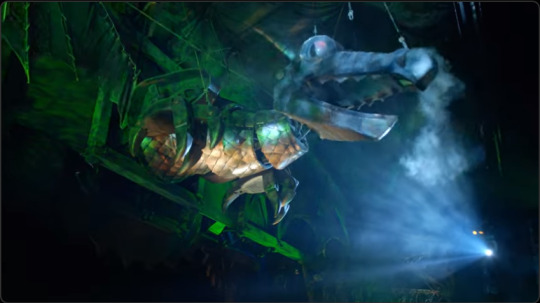
Final Thoughts
I have a love for Wicked, to the point where it is one of those formative stories for me. The music is fun and as I grew up, I realised that I empathised with more characters than I was entirely comfortable with.
If this is the first of my posts you have read, I do analysis of storytelling. This will be a series on Wicked as a whole, specifically delving into the songs and what they say about the musical's themes. Next week, I will take a look at The Wizard And I, so stick around if that interests you.
Next
#wicked#rants#literary analysis#literature analysis#character analysis#what's so special about...?#wicked the musical#wicked musical#elphaba#the gospel of elphaba#glinda upland#elphaba thropp#wizard of oz#no one mourns the wicked
58 notes
·
View notes
Note
Who get the biggest passes from Buffyverse fans and can you give examples of the worst things these characters do?
Well this is a juicy question.
Spike, and Cordelia.
Interestingly, at some point, both characters were given the role of calling Buffy out on her "crap." James Marsters even talks about how he was brought in as a replacement for Cordelia in season 4, but then was replaced by Anya when they decided to do something else with him.
With Cordy being the mean girl, and Spike the soulless vampire, the writers had the freedom to use these characters to say and do some incredibly cruel things towards Buffy in the name of "brutal honesty," while also excusing their behavior because they weren't meant to be the hero...at least initially.
This worked a little too well, as Charisma and James were amazing in their roles. Each character is charming, beautiful, multifaceted, and extremely funny.
The problem is, you can't keep your characters stagnate, so the writers were forced to give Cordy and Spike character growth, but also find a way to retain who they are. This is incredibly difficult when your character was literally written to clash with Buffy, and is popular for saying mean, biting things in the name of "tough love."
-Cordelia-
While Queen C is more than the resident mean girl, her cruel words and selfish behavior are praised as "truth" and confidence, with her belittling nearly every member of the Scooby gang. She is constantly pitting herself against Buffy; (Homecoming, Halloween, etc) demeaning and belittling her when Buffy has personally saved her life several times. She begins to show signs of character growth in season 3, but once Xander cheats on her, reverts right back to blaming Buffy for everything. Instead of holding Xander accountable for his actions, she makes a wish that Buffy never came to Sunnydale, and then never sees the consequences for her own actions.
Even after her move to LA, she calls Buffy a cry-Buffy, blames her for turning Angel into Angelus, emasculates Wesley, victim blames and shames a SA survivor (Untouched), and is generally just careless about what she says or does, with no thought about how her words effect others.
Personally, while I do see some growth over her time on Angel, I do not buy her characterization in the later seasons where she is drastically changed to become a Champion, and then shoe-horned into a relationship with Angel. On top of that, she never atones for or even recognizes her need to change for her awful behavior, and that makes it very hard for me to forgive her for her past sins, let alone root for her.
It's possible that with better writing and without Joss being a horrible person, that her transition would have been more organic and believable.
-Spike-
For a show about feminism, the writers really spend a lot of time on this man. He steals Buffy's underwear, stalks her, makes a sex robot that looks just like her, attempts to kill her multiple times, boasts about killing and torturing other slayers, justifies it by saying they wanted it, ties her up, then spends a season belittling her just so that she'll sleep with him. THEN when she refuses sex with him, attempts to force himself on her.
And for those of you who say, "oh he just didn't have a soul yet." Fine.
After he had a soul, he boasts about assaulting her, shames her for using him for sex when he knew she didn't love him, shames her for not loving him, and blames her for the reason he's tortured with having a soul. (Beneath You)
He nearly kills Robin Wood, and then mocks him for not being loved by his mother (which is proven to be false in "Damage"), all while wearing the coat that he stole from Robin's mother after he killed her.
Not once does he apologize to Buffy or attempt to hold himself accountable, even after he has a soul. It is not until "Damage" on Angel that we see any sort of unselfish remorse.
Then to add insult to injury, season 7 has Buffy spending so much time taking care of Spike, rescuing Spike, training with Spike, reassuring Spike that he is a good man...all to the detriment of her other relationships. People like to blame the Potentials for why season 7 is as clunky as it is, but I blame the focus on Spike.
Even worse, the show doesn't seem to want Spike to change, as there's hardly a difference between pre souled and ensouled Spike. And that goes against the show's core tenant of choice and growth.
From the very beginning, vampires represent the opposite of adolescence in that they are stagnate and do not change. "Fool for Love" very clearly establishes that Spike's persona is created to compensate for his lack of an identity. Cecily's rejection of him deeply wounds him and he is shown to create a facade to mask his insecurities. So he takes from powerful women and forms a false identity around them to prove that he is not beneath them. The episode emphasizes this pattern with Cecily, Dru, and the two Slayers, continuing in present day with Buffy.
In order to be consistent with the lore and message of the show, ensouled Spike needed to look a lot different from un-ensouled Spike, but the writers knew he wouldn't be as popular.
And so we're left with a half baked season where we're supposed to believe that Buffy is distant from everyone but Spike, who looks the exact same as he did the season before when he tried to force himself on her.
It's just icky. It's the opposite of empowering. It blurs the lines of the lore. And it sends the wrong message.
We can like these characters and even root for them, but we need to be honest about their flaws, and not justify awful writing and problematic characterization.
#buffy summers#buffy the vampire slayer#buffy btvs#tv: btvs#buffy watching#becomingbuffypodcast#sarah michelle gellar#alyson hannigan#buffy anne summers#btvs s5#anti spuffy#anti spike#anti cordelia#bangel#buffy and angel#buffythevampireslayer#not really anti#i dont hate them
96 notes
·
View notes
Text
A Gaylor interpretation of "The Prophecy" because if Taylor never sleeps why should I?
TW: I tried to keep it mostly light, but ended up veering into brief talk of self-destructive behavior and suicide near the end.
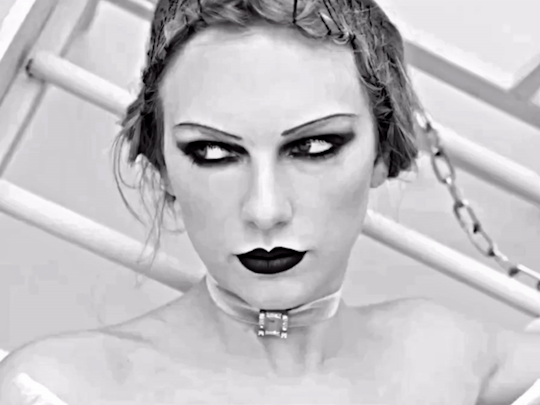
Overblown Analysis Under the Cut ↓
"Hand on the throttle / Thought I caught lightning in a bottle / Oh, but it's gone again"
I think this song is about failed coming outs and closeting. Of course, many in this community know of the Lover failed coming out, but God only knows if that was really the only attempt. I think she tried to at least subtly come out several times. But during Lover, she and many others thought she would finally make it out of the closet, a once-in-a-lifetime chance, fully ready to go and take control, but plans were foiled. If it wasn't the first or last attempt, the chance was gone again.
"And it was written / I got cursed like Eve got bitten / Oh, was it punishment?"
Taylor begins to question if her coming out plan(s?) fell short because she's cursed for being who she is. Was she cursed like Eve was for biting the forbidden fruit? Eve in some interpretations of Christianity is often seen as the blame for all the world's sins, with Mother Mary being seen as God's Eve "do-over", since Mary stayed obedient to God's wishes. Sometimes Eve is even depicted as tempting or tricking Adam into eating the fruit, it being her fault he fell, rather than his own choices ruining him. Whether or not Eve is actually to blame could be debated forever, not unlike how Christians debate similarly about whether the bible is okay with queerness or not. Taylor wonders if never being seen as who she is by the general public is a punishment for her simply being. Interestingly, Taylor changes Eve's story, saying Eve was bitten, rather than the biter, possibly by the serpent/Devil in the garden gate of Eden. Being bitten by a snake actually reminds me more of Cleopatra more than Eve, but I'll elaborate more on that later.
"Pad around when I get home / I guess a lesser woman would've lost hope / A greater woman wouldn't beg / But I looked to the sky and said / Please / I've been on my knees / Change the prophecy / Don't want money / Just someone who wants my company / Let it once be me / Who do I have to speak to / About if they can redo the prophecy?"
Somewhat self-explanatory. Taylor anxiously paces as she asks God if her fate can change. If she can just get free. She doesn't want the money that comes from the beardings and closeting any longer. She just wants to be seen for who she is. She wants someone who wants the real Taylor's company, not the showmanship Taylor. She wonders what God or entity she has to ask to be freed from the cage.
"Cards on the table / Mine play out like fools in a fable"
Taylor has used card games as imagery before, usually in situations where she feels like someone isn't being honest with her, playing her. Most significantly for this reading, in "Foolish One" she speaks about how her cards were on the table, or that she was being open and vulnerable, while that song's muse wasn't showing theirs, as they weren't being clear, leading her on. In this situation, Taylor is once again laying all her cards out for the world to see, but it's foolish because the world never sees it, whether it's from not knowing how to or not wanting to. Fables are very similar to folklore or folktales, characterized as short, clear, fictional stories, often featuring animals. Taylor is saying that while her cards are clear, her stories must be told through vague, or "fool" characters that distance her from them, fictionalized. Both Gaylors and general Swifties seem to currently agree that her album Folklore has truth in it and isn't fully fictionalized, but exactly how much is fiction, and who represents who seems to be where opinions differ. And then there's a lot of infighting between the sides of the fandoms, so Taylor stays mostly unseen and caged.
"Oh, it was sinking in (Sinking in, oh) / Slow is the quicksand / Poison blood from the wound of the pricked hand / Oh, still I dream of him"
The feeling that she'll never be free sinks in, slowly over time, like sinking into quicksand is slow, or poison through your body from a small prick. She dreams of someone. One way to look at this is that she's dreaming of someone she loves, the muse of this album. I, however, for now at least, get this feeling that the dream is actually more of a nightmare. I mentioned in my makeshift theory on "The Manuscript" that I believed "The Professor/He" was a personification of the music industry or an industry boss. Taylor's said before that she's had nightmares about the crummier aspects of the industry, like unwanted photos and videos of herself. Maybe she still does (as a slight sidenote, I feel like this could be connected to Kissgate, as that was filmed without her wishes, and arguably when the closeting and bearding amped up heavily). She even mentions nightmares in "Cassandra".
"And I sound like an infant / Feeling like the very last drops of an ink pen / A greater woman stays cool / But I howl like a wolf at the moon / And I look unstable / Gathered with a coven 'round a sorceress' table / A greater woman has faith / But even statues crumble if they're made to wait"
The ink pen feels like Taylor's saying that she's slowly burning out, down to the last drop in her, tired of writing letters addressed to the fire and sending signals, as she runs out of ways to say her truth just for it to fall upon deaf ears. A more stable woman wouldn't show her pain, but she's so loud about her truth like a wolf, yet soundless. She gets more desperate like a helpless child as she continues to wait, still grappling with the guilt that can come from being queer and a Christian at the same time, like she's a witch with a coven. She knows she's supposed to keep her faith by staying in the unseen shade of the closet, after all, "There's no such thing as bad thoughts / Only your actions talk (from "Guilty as Sin?")". But waiting to be free for however long is taking its toll. At the Spotify TTPD pop-up library, Taylor featured what's seemingly a bust of Artemis/Diana, the Greek/Roman goddess of the, most significant to Taylor, archery. (Yes, the name Diana is very curious for Gaylors, but—unpopular opinion—maybe—I don't think it actually means too much to the song itself) After hearing about an Artemis statue being destroyed in regards to that symbolism, when digging, I found a few stories about Artemis/Diana's statues or temples being destroyed, whether it's half of Diana of the Tower burning and the other half being lost or the Temple of Artemis at Ephesus being the victim of arson in 4th century BCE. Just like Artemis/Diana, Taylor gets destroyed unexpectedly. (I've also heard of an Artemis/Diana statue that was destroyed by time, but I can't find a source for that story that doesn't connect to the Taylor pop-up).
"I'm so afraid I sealed my fate / No sign of soulmates / I'm just a paperweight in shades of greige / Spending my last coin so someone will tell me it'll be okay"
Taylor fears that her fate to never be seen is her fault, as she willingly participated in the closeting and beardings, so she's cursed to stay that way forever, never getting to mingle with other queers as one of them, like a soulmate, but an "ally", as she's too big to hang out with them. In slang, a paperweight is a useless object; Taylor probably knows that her coming out could mean a lot for queer people and the movement, but since she hasn't been able to come out, at least not in a way that is universally recognized, she feels useless compared to what she could be. Greige is a combo of grey and beige, much like the sepia aesthetic of this album. It's almost colorless, as she is forced to be grey rather than a rainbow with all of the colors due to closeting. The use of sepia or greige could symbolize that this album still has a thin coat of bearding and closeting attached to it, even though it could also be seen as a big step into the daylight. She tried to see daylight times before, "but the woman who sits by the window has turned out the light" (from "Peter"), at least for now. After her "postmortem", Taylor spends what I interpret as an obol, a coin a shade, or ghost, given to them before burial, that's paid to Charon, the underworld ferryman in Greek mythology; the fee would let a shade cross the river Styx to get to Hades. But Taylor pays only in the hopes of being comforted by someone after her "death". To be told that everything will be okay after the grey fallout. An obol would be the last thing a person would own from their time on earth, so it's her last coin. Taylor being a shade could call back to lyrics like, "Shade never made anybody less gay", in "YNTCD", having the double meaning of shade as in vitriol and the dark shade of the closet, and "Sit quiet by my side in the shade" in "Paris", where her private lover quietly sits in the closet with her. In "The Archer", Taylor mentions "And all of my heroes die all alone", interpretively due to them being queer and not getting to have a privileged life in that sense. Maybe in the afterlife, Taylor hopes to find and be comforted by one of these heroes.
I mentioned Cleopatra earlier, and while as far as I know Cleopatra wasn't queer, she is treated similarly to Eve, often blamed for the temptation of men; Cleopatra allegedly self-inflicted a snake bite to end her life, like how Taylor's Eve was bitten. Taylor has similarly been treated like Eve and Cleopatra, seen as "going through men like potato chips (a real fucking quote I found while researching for this post)" whether that's the exact case or not. Taylor's also illuded to self-inflicting harmful actions that could kill her in several songs, like "Hoax", and including on TTPD: "Love left me like this and I don't want to exist" from "Florida!!!" Even quicksand and poison mentioned in this song are ways to die. Whatever the reason behind these lines might be, I hate that she may feel that way and I worry that it's a somewhat ignored aspect of her music, brushed off as dramatic. It makes the asylum theme of TTPD much more tragic. I wish nothing but the best for Taylor. 🤍
I make a part 2 part to this
#tinkered with this instead of sleeping hope you like it ✌️#i love this album it's ruining my life#taylor swift#the tortured poets department#the prophecy#gaylor#gaylor swift#friend of dorothea#lgbetty#gaylor theory#song analysis
27 notes
·
View notes
Text
I don't want to scroll through the internet to look at reactions or discussions about anything in Doctor Who right now; I need a detox. I really need it. But for now, I'll say this:
In any work, if you see a character who wasn't there before in a particular episode or part of a franchise, and they occupy an important side character role, pay attention to what they show you and how they develop that character. Because this detail is not for nothing: no one will bother to develop a one-time character (like a tissue) for you just like that - they want you to get attached. And this is exactly what’s important – to hook you like a fish. The writer needs your emotional attachment to eventually play with your feelings and intentionally mess with your emotions. Or at least try. The goal is obvious, and I don't respect that. If your goal when writing something is merely to manipulate the emotions of your viewer/reader/player, then your work is worth nothing; it is as disposable as your character, whom you got rid of.
Xion in Kingdom Hearts is a textbook example. Kingdom Hearts doesn’t really bother with the development of character relationships very much – the trio of characters from Birth by Sleep only got one scene in the prologue that shows they are childhood friends (so poorly done that it could have been written in white text on a black background – they are childhood friends, their names are Terra, Ventus, Aqua, they train with Eraqus and take their exam tomorrow). Because their essence isn’t to be developed characters – they exist only for the villain Xehanort, to show how bad a villain he is, in case you didn’t get it from his goatee and bald head. The original trio showed their characters similarly, albeit in more detail and the execution was overral better. But 358/2 Days… no game in the franchise focused on the development of its characters’ relationships throughout the game as this game did. And, interestingly, it’s the only one where a character literally died, and their conflict revolved around this character. The development of Roxas and Xion’s relationship was central to the game, and Axel’s knowledge of who she was complicated the relationships within the trio. Why so much attention to this character? So you’d get attached to this character, and her death would be important to you as well as to the characters. At least that’s the intention. They want to influence their viewer; telling a story isn’t enough for them.
There is a donghua that got a reputation as a tear-jerker, and not for nothing – Link Click. In the first season, events were divided into cases. And the longest case lasted three episodes. No other story in that season, before or after, paid so much attention to the client’s life and past. Guess what happened at the end of that case? You're right, there was an earthquake, and all his close ones, except for the client, were dead. Especially much attention was paid to the death of the client’s mother. All this world-building of environment and character development was to make the viewer cry. Or the main victim of the whole season – Emma. Her death was at the center of attention twice. First, at the end of the first episode, and once more at the end of the season. And each time her death was preceded by a touching scene with her family and how much she missed them. The role of Emma in the second season was taken by Li Tianxi, a girl who lost her speech due to her mother’s request not to talk about her father beating her mother. She was also killed, and she spoke only at the end, the words taught to her by her brother, who made her “well-being” his life goal. All her character traits, all her development were aimed at her being killed to make the viewer feel sorry. Such utilitarian treatment of characters offends me because it turns out that the writer is not inventing living people only because characters should be developed to be their own personality, but to exchange this development to the viewer's emotions and tears.
The same thing happened with Doctor Who in this new episode. I like Rogue, he’s a good character. Even before his death, it was clear that nothing held him anymore after the death of the person he loved, and therefore his readiness to sacrifice himself at the end of the episode didn’t seem far-fetched, as it might in other similar cases. He is well depicted, he’s interesting, there is enough material to write a decent fanfic and build headcanons about his past and how he ended up like this. Big Finish will surely produce a box set or two with Jonathan Groff. Because there is potential, there is material, he is a formed character. Hence the question – why does he have so much detail? The reader of this post already knows the answer – to make the viewer sad. This, the author of this post suspects, is also why the Doctor's infatuation with Rogue is at the center of the narrative. There’s another "red flag" that was in this episode – the Doctor invited him to the TARDIS as his companion. Doctor Who has done this before. It did similar things with Victorian Clara. There also was a romantic subtext with the Doctor, also the Doctor invited her to the TARDIS, she also was an excellently developed character, superb companion material. The author of the post didn't even mention Astrid from “Voyage of the Damned.” Ominous, meaningful ellipsis…
What the author of this post wants to say with all this – don’t develop characters with the sole intention of eventually killing them off. Especially attaching them to any form of love story – a careful viewer will be wary. Especially in Doctor Who, where no love story with the Doctor ended well.
This will be an unpopular opinion but there is a Doctor Who episode where the secondary characters and the guest companion were well developed and didn’t even die!!! Which is wonderful. This episode is “The Hungry Earth/Cold Blood.” Nasreen is a fantastic character, and the entire supporting cast is well depicted. This example shows that what this post is about is possible and feasible. On this note, I conclude my essay.
#doctor who#ruby sunday#jonathan groff#rogue#dw spoilers#доктор кто#the doctor#kingdom hearts#link click#xion#roxas#axel#lu guang#cheng xiaoshi#kingdom hearts spoilers#link click spoilers#doctor who spoilers
20 notes
·
View notes
Text
okay i am going to say something potentially controversial about sb94 now that i'm partway through and say that i think a lot of the big problems with it are exacerbated by the fact that karl kesel and ron marz had two different narratives they wanted to explore/tell regarding kon.
kesel very much wanted to explore the exploitation of the child star--and everyone around kon is exploiting him. rex is exploiting him for money and tana is exploiting him for her job. and i agree, kesel didn't go near hard enough in condemning the tana & kon relationship, but there are definitely nuggets there that the people around them knew it was shady and that the writers knew tana was wrong for pursuing it (you get her coworkers gossiping about her at the water cooler, her boss removing her from superboy stories because of conflict of interest, she's got a nasty look on her face while beefing with 16 year old girls, there's a decent amount of references to kon being underage the weekend before they get together she spends the whole weekend nagging and complaining about him before finally deciding to aggressively go for it when he's at his absolute lowest....i'm just saying that none of that comes across as particularly aspirational to most 16 year old boys lmao.). there's an expectation that as a working star, kon is expected to be an adult and have adult maturity despite being a child still. and nobody is protecting him because they probably don't see him as a human, let alone a child by the nature of his fame. who would be there to intervene and help anyway? everyone is exploiting him, they have something to gain from keeping him under their thumb, they're not there to protect him. some names you should consider while reading this part of the run are drew barrymore and brooke shields. in more recent memory, jennette mccurdy is another excellent one to consider. so when you ask why nobody is interventing and condemning characters like tana and knockout, it's the same reason nobody batted an eye at drew's mother giving her cocaine at 9. or brooke shields being in pretty baby. even today people get outraged at some 30 year old actor dating a 17 year old, but nobody ever actually intervenes in those situations to protect the child in question and the 30 year old is almost never punished socially or professionally for their skeezy behavior.
and immediately after the knockout storyline, you pivot over to ron marz. and marz very much preferred to explore the peter pan, never going to grow up, what is the humanity of a clone angle versus the child star angle. marz is the one who froze kon at 16 because he wanted to explore the peter pan angle of the boy who is not human and can't grow up and talk about the ramifications of cloning and humanness, makes the love triangle with tana and roxy really stupid and forefront to the narrative without ever touching on the exploitation angle of any of it, gets rid of rex and his exploitation of kon, and increases kon's immaturity as just a perverted teenage boy who is now the aggressor in the relationship vs the exploitee, and so you get almost this incongruence and inability to resolve the exploitation in any satisfactory way because the story has changed. kesel wanted to tell the story of a child star who was forced to grow up and mature too fast and marz the story of a boy who can't grow up at all. idk. and those narratives don't have to be diametrically opposed and, in fact, could work together interestingly for kon, but the way they're written really only serve to exacerbate the overall flaws and problems of the other.
add that to the fact that the themes they were going for weren't necessarily written well and were very, very 90s in their nature and you end up kind of being able to see how exactly that book ended up so problematic in so many ways.
#now i am only partially through my read i reserve the right to change my mind#but this is just my 2 cents so far
69 notes
·
View notes
Note
thoughts on sirius/narcissa
thank you very much for the ask, anon! this has the potential to be an interesting and controversial one...
i've spoken here and there about how - as much as i loathe the character commonly known as fanon!sirius - i'm also not the biggest fan of a version of sirius which has emerged as a reaction to this, who we might call dark!aristocrat!sirius.
this sirius - who appears not to have realised his canon self is being sarcastic when he says his parents considered themselves "practically royal" - is, i'm sorry to say to the aristocracy fans, just as distorted a version of the character as the heavily-tattooed and tiny fanon!sirius. and that's fine, obviously - people are entitled to like and read and write what they want - but it's not going to stop a tear beading in my eye whenever i see it...
[one day i'll hit publish on my the black family are not politically important manifesto and be removed from the fandom...]
which is to say, the sirius who tends to be shipped with one or other of his cousins - although, for exactly the tedious pro-aristocracy, people-belong-with-their-own-kind reasons outlined above, the cousin in question never seems to be andromeda - is this dark aristocrat version, and he's usually written as wanting to fuck either narcissa or bellatrix because the only woman worthy to be with a male scion of the house of black is a female scion of the same house.
and i think it's out-of-character and i think it's dull!
now, if you're looking for the whole twisted-obsession-ruins-the-vibe thing, i can see that there's a plausible case for sirius/bellatrix - they're set up by the canon narrative as extraordinarily similar [and i absolutely read sirius' claim in order of the phoenix that andromeda was his favourite cousin as a lie, covering up the fact that, as a child at least, that role was taken by bellatrix]. i think there's something very interesting which can be done with both of them shattering the expectations of their families in ways which would evidently be quite shocking in a society with such restrictive mores. bellatrix massively defies gendered conventions which require a pureblood woman of her social class to be little more than a wife and mother [although that she does so without being able to leave her family, like sirius, is because - you guessed it! - of those gendered conventions themselves], while sirius shirks his expected social role as the eldest son, upsetting the "natural" order of things in his family's eyes. that can, i think give some interesting flavour to that pairing.
but sirius and narcissa never - in my view - hits in the same way. while they're closer in age than sirius and bellatrix, their personality types are sufficiently divergent [but not in an interestingly conflicting way - their major difference is largely that narcissa doesn't seem to be particularly fun] that the spark is lacking. and this, i think, is the reason why siricissa tends to hang really heavily on the idea that it is hot, glamorous, and aristocratic to have sex with your first cousin.
and look, one of the only bits of "pureblood culture" fanon i accept is the idea that blood-supremacist families practise arranged marriage [i think sirius' comment in order of the phoenix about parents "only letting" their children marry other purebloods essentially confirms it], and that first cousin marriage may well be their cultural practise as well. but arranged marriages [and, indeed, cousin marriages - which are obviously considered much less unusual in some cultures than others] aren't inherently interesting things. they're just things some people do.
but the vast, vast majority of the sirius/bellatrix or sirius/narcissa i've ever seen thinks that the blood-relation element and that alone is enough to justify the ship as hot and exciting and wicked. and it's not.
what i would like to make the case for instead is shipping narcissa with regulus.
my reading of narcissa has always been that she's somebody who - a little like petunia dursley - feels an absolutely enormous pressure to adhere to social convention, owing to the shame she perceives her family as receiving following both andromeda's desertion of them and bellatrix's refusal to conform. she's someone, i think, who really leans into the character of the perfect lady-of-the-manor, the model wife and mother, the pure ideal of wizarding womanhood - and i think you can do a lot with her experience in this gilded prison of her own, and society's, making.
regulus too is someone who canonically conforms - again, as sirius tells us, as a reaction to sirius' own defiance of the behaviour expected of him by his class and blood status. i think the two of them finding themselves in a relationship which is constantly battling against this artifice - whether they end up clinging all the more tightly to the masks they wear in public or they're able to help each other gradually become more open and real - would absolutely slap.
#asks answered#asenora's opinions on ships#siricissa#sirius black#narcissa malfoy#this isn't a safe space for pro-aristocracy takes#it comes from living in a colony
25 notes
·
View notes
Text
I just know I'm gonna get people to look at me (my blog) sideways for this and I promise you that is not my intention.
Probably a hot take, probably not.
But after a lot of thinking and writing fics, I'm starting to think that Yuji being Kenjaku's favorite is more fanon than actually canon. Like... is it canon? It is fanon? It just feels so... I don't know how to describe it. It's just something that we barely got any interactions between Kenjaku and Yuji and Kenjaku doesn't really talk about Yuji unless he's brought up somehow and only once they mention him on their own accord.
What I mean is, I don't think Kenjaku looks to Yuji like "that's my favorite child and I care for him". It's more so like, to me, Kenjaku may look to Yuji like "He's my most successful experiment".
I say this because of how Kenjaku is and what they have done. So far, Kenjaku really hasn't done anything worth showing actual affection for their kids. When it comes to Yuji, the most they have done was mention him to his ex-schoolmate Sasaki, talked briefly to Choso about him and told Yuji they expect much from him (during the Culling Games).
Particularly that last bit honed it for me that Kenjaku sees Yuji as another experiment. Throughout chapter 136, Kenjaku had used Yuji twice as an example when discussing their plan for the upcoming Culling Games and it comes off more like someone presenting a project than a parent talking about their kid.
It would make sense to use Yuji as an example to get the others to understand what they mean because Yuji is, at the time, the only person who is a vessel that they know.


In chapter 203 when asked by Choso what is their plan for Yuji, Kenjakh just answers they don't really have one and that Yuji already plays his part as Sukuna's vessel.
It comes off like "I'm done with him now" way. Like, Kenjaku now has nothing else for Yuji and that project is done. Now, Kenjaku could have said this to tick Choso off and to hide their true intentions, but it also could be how they really do feel about Yuji. Just another tool in their plan in merging humankind with Tengen. Just a start to that plan. Just a vessel for Sukuna.

In this translation, I noticed Kenjaku calls Yuji "that thing". Now, I don't know how close this is to what Kenjaku may have actually said, but something to think about.
I think back to how in the previous chapter, Kenjaku shows disappointment in how Choso and the rest of the Death Paintings turned out. Again, just experiments for them.
There's also the other instances from other parts of the story. Kenjaku tricking Choso to almost killing Yuji, using a very aggressive attack against Yuji at the end of the Shibuya Arc, lurking around and following Yuji during the arc with Junpei.
Moments like these just feels like, yeah, Kenjaku was watching and testing how their experiment was adapting.
Now, what about in chapter 160 when they thank Sasaki for being nice to Yuji?
I would say that's the only time Kenjaku shows some bit of care to Yuji and interestingly enough, maybe was a little thankful there was someone who didn't make Yuji feel so alone at school and treated him like a person (mind you, Sasaki actually was clueless how people thought of Yuji until she was informed of it). Kenjaku could relate to Yuji in that sense of loneliness.
Now about that scene, it could also just be Kenjaku being Kenjaku and toying with people. That bit was, of course, written to confirm that Kenjaku is Yuji's mother (143 shows Kenjaku possessing Kaori's body). It was at that time Kenjaku was leading people to other locations just to use then later for the merger.
Kenjaku does things for their own amusement and to satisfy their curiosity, after all.
Before thinking otherwise, do I hate the idea if Kenjaku actually caring for Yuji (even in their own evil way)? No! Honestly, it intrigues me. For one, Kenjaku caring for someone is... unique to how they are as a character. It makes me question that after many, many years has Kenjaku finally have someone they feel even a little affection for? Or would that affection come from Kaori, the woman whose body Kenjaku used to birth Yuji.
We don't know much about her, but I think just like Jin, she wanted a child. And no doubt, she would have adored Yuji with everything.
If Suguru reacted to Satoru's voice calling to him and choked Kenjaku... what if whenever Kenjaku does express any bit of affection for Yuji, it's from Kaori?
If techniques can carry from one body to another when Kenjaku inhabits a different one, how about one's own feelings just like their memories? Memories create feelings. What if Kenjaku still has Kaori's memories?
I don't know, I'm just rambling here really.
Still adjusting to fan theories and all that. I'm just finding out there was a theory that Yuki could have been Yuji's mom.
#just expressing a thought here#I'm like still shaking off sleep writing this#just kiya's thoughts#jjk#jujutsu kaisen#jjk manga spoilers#jjk spoilers#kenjaku#kenjaku jjk#itadori yuji#yuji itadori#yuuji itadori#itadori yuuji
23 notes
·
View notes
Note
do you have thoughts on how ewan mitchell compared aemond to the cyclops in his interview...?
Um absolutely. Ewan Mitchell's recent interview has completely ruined my life, and especially so because of that very part.
In case you missed it, Ewan said that one of the first things the showrunners ever talked to him about was this very idea of the Cyclops. "What does that do to a person?" asked Ewan in the interview. "To know the day you're going down, and feel bulletproof to a point."
This means the showrunners canonically have written parallels between Aemond and the Cyclops from Greek mythology, who traded one eye to Hades, the god of death, in order to see into the future and discover how he died. This wasn't explicitly mentioned, but Norse mythology also carries a very similar story of Odin, who sacrificed one of his eyes in exchange for drinking from a well that would give him unparalleled knowledge. And it suggests that, with the loss of his eye, Aemond gained not just Vhagar, but the knowledge of his own death.
And GOD does that add so much depth to the show, and to his character. Especially the standoff between him and Daemon: a lot of people read this moment as Aemond backing down out of fear of Daemon's implicit threat. But to me, it now seems more like an acknowledgement: "it is not yet our time."
It also, interestingly, strengthens the parallels between him and Helaena, but I'll go into that another time.
Okay, now it's time for book spoilers, and I'm gonna make myself sad with this one.
If Aemond KNOWS how he is going to die-- if he knows WHO kills him-- then it makes him provoking Daemon all the more interesting. Because his toast at the dinner must have been deliberate; right after Daemon kills someone for calling Rhaenyra's children bastards, and Aemond goes and does the same thing? Who would be so insane, except someone who knows that he will not die that day? Who would want to draw Daemon's ire, save for someone who knows it will be inescapable no matter what they do?
It also makes the way he goes to his death all the more honorable. He doesn't try to run away, even though he has much to live for: his family, his lover, and especially their unborn child. In fact, he seeks Daemon out, as if he'd simply been waiting until the time was right. And he goes to mount Vhagar for the last time with grace, and without fear.
Also, there's no way Vhagar didn't know there was no coming out of that fight for Aemond. Regardless of what you think about a dragon-rider bond, we know for a fact that things like pain are transferred through the bond (Rhaenyra and Syrax), and the emotions involved with knowing you're about to die are too strong to not seep through. I've always had this headcanon that Vhagar made a conscious decision to go down with her rider, and I think that if she had knowledge (through Aemond) of his doom, this makes it all the more likely. There's something very beautiful, if very sad, about the oldest, loneliest dragon alive, deciding that if her rider dies she no longer has anything to live for. Or, even, deciding to fight for him, even if his heart tells her it will be futile.
Lastly, if the books are correct in their portrayal of his final moments, it means that despite the years he had to prepare himself, he cannot help but succumb to terror at the end. In the books, he is barely twenty years old-- barely beyond his teenage years--and so of course he dies as what he truly has been, all this time: a lost, and terrified boy.
In summary, I am not ready for what's going to happen to my baby boy :((((((((((((((((((((
#ask#asks#answered#aemond#aemond targaryen#ewan#ewan mitchell#vhagar#daemon#daemon targaryen#hotd#house of the dragon#show#books#aemyra#hotd meta#meta
238 notes
·
View notes
Note
Thomas’ relationship with his mother implies he was given all the necessary love and affection a child should receive, and his desperation for acceptance is silly and not born from any deep-seated abandonment issues. Everything else about his portrayal is contrary to this premise. It’s so odd
Thank you for bringing this up because I've been wanting to make a post about the scene in 3x05 for ages and never gotten around to it.
The thing with Thomas is: he doesn't lie. That's established in canon. He is an honest person - almost brutally so if we think of the painting or Button FM. So when he says his mother was there but not really there, I just can't chalk it up to him being dramatic. Because the way this scene is built is similar to the way he talks about his death. Both are painful memories for him, and in both cases he distracts his audience from that pain. He makes up a ridiculous kiss with Isabelle that never happened (an embellishment or wishful thinking on his part, if you will, to make it less painful) so who's to say he isn't doing the same when he says his mother eventually came to comfort him?
We know from the book that she did support his writing endeavours so him saying she introduced him to publishers is true and we can assume the same for her putting up his poems on the walls. But while financial and professional support is certainly nice to have, I think what Thomas actually longed for and didn't get is emotional support: a hug when he was upset, a kiss on his knee when he scraped it, a bedtime story to help him fall asleep after a nightmare.
There is obviously a lot of room of interpretation here but I'd go so far as to say that Thomas's mother was emotionally distant and that there's more to what he says about her than meets the eye. The poems on the wall, for example: who's to say that wasn't as far as her interest in them went? Imagine little Thomas, proud and grinning, handing her a poem he's just written; imagine his mother merely glancing down at it before handing it over to a maid to frame it and add it to the collection on the wall. That's neither being loving nor supportive. That's having no interest in your child.
We could always look at it the other way around, too: what if she'd gushed about his poems as if they were the best thing ever written in the history of mankind, giving him false expectations? What if she'd lied to him about how good they are? People lying to him is a theme that's connected to Thomas's character as much as him feeling alone and unloved is. You have Francis lying to him to get Isabelle, you have people in his life constantly pretending to like his poetry because that's what etiquette demanded, you have Alison lying to him about what con means ... So what if his mother was the first person who lied to him - about his poems, perhaps even about loving him?
Interestingly, Thomas never mentions his father or any siblings which could mean that he's an only child and his father either left the family or died, perhaps even before he was born. It could also mean that his mother remarried and he grew up in a household where he was always something of an outsider, a reminder of the past (which might explain why he doesn't sound Scottish btw). It's all speculation, obviously, but he could have very well been the Cinderella of his family - tolerated but not truly loved.
Again, I'm just trying to offer a different perspective on a scene which, at first glance, looks like nothing more than Thomas being dramatic and attention-seeking as always. I'm not saying my interpretation is right, but given that Thomas has a history of making light of his own painful memories, I think there's at least a possibility that there's more to his story about his mother than meets the eye.
31 notes
·
View notes
Text
The Owl House's First Reveals
The Owl House is a master class in archetypal storytelling. I have a whole post entirely dedicated to how it corresponds with one of the most iconic secret world magic school stories of the current era. But the key to good archetypal storytelling is that it engages with the archetypes and stereotypes.
By this, I mean that the characters fit specific tropes. The mentour, the bully, etc. But this is entirely superficial. To every character in this series, there is more going on under the surface that adds nuance to the characters.
The Owl House is lauded for its reveals. The unmasking's of Bump, Hunter, and Bellos are iconic, but every character in the show wears a metaphorical mask, that being the archetype they embody. When these are removed, or chipped away at, things get interesting. And nowhere is this more obvious than in Lost In Language
Let me explain.
SPOILERS AHEAD

Let's start with the obvious. Amity. This is the episode where we learn about Amity's whole deal and where Luz makes some majour steps towards befriending her.
I don't think enough credit is paid to the voice acting here. Because Mae Whitman (@whitmanmae), who voices Amity, is doing something with affectation.

When Amity is introduced, and in most of her early scenes, there is an air of superiority in her voice, it sounds like there is a permanent sneer. This only falter when she gets angry or stressed. It's something Amity is putting on intentionally, it's a character choice.
So, what happens when Amity stops with the persona and starts being open and honest? Then Whitman drops the affectation and assumes a different speech pattern. The voice acting changes to match the change in character.
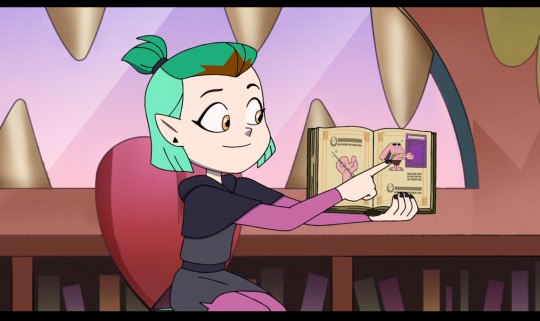
I bring this up here because the scene above, with Amity reading to the children, is the first time we see Amity's relaxed voice. This is the voice that will go on to be the most iconic and synonymous with the character. This is the mask that has been removed, and underneath, is a character who is completely fine putting on voices and reading to children, with zero care about being embarrassed.
It is also worth noting that the hair dye is starting to run thin here. The colour of Amity's hair is an important metaphor for her character arc, and here, as the mask slips, the dyed appearance is fading to reveal the roots underneath.

The storybook motif of this episode plays into this theme.
I have said in the past that Luz has a fairly flat character arc, and I meant it. But that doesn't mean she doesn't have flaws to overcome. This episode dives into one such flaw.
The reason that the series utilises archetypal storytelling so much, is because that is how Luz thinks. Luz's flaw is ignorance, or more accurately, naivety. She very much wants life to fit with the archetypes that she has in her head. That is why she gets scammed in episode two, and that's why here, she directly causes the problems of the episode. She tries to play with storybook rules, she tries to take shortcuts to friendship. This causes problems because, as I have stated, there is nuance to these characters, and as such, shortcuts don't work.

Otabin is the embodiment of this. A character warped beyond all recognition by a tiny nuance in the drawing brought to life. A little change has a big impact and turns him into a different character who cannot be treated the same way.

Interestingly, the conflict resolution is literally just write your own story and you would assume this moment works, with the cape and the staff. But it doesn't. Why? Because it's Luz writing herself into someone else's story. She's not Luzura yet, because to be Luzura, she needs to be Luz first, and she's avoiding that.
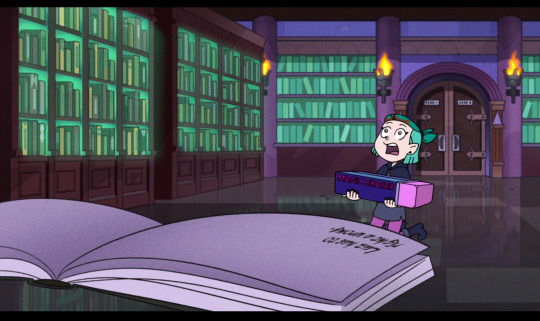
In the end, the story is written together, and it starts with:
Luz needs to right a wrong
For the new story to begin and the relationship to actually work, Luz needs to let go of preconceived expectations and start taking the story as it is, instead of adding to something it is not.
That's how she befriends Amity as the episode closes. Instead of trying shortcuts, she sees something personal to Amity and offers to help. The book. And it causes Amity to open up, slightly.
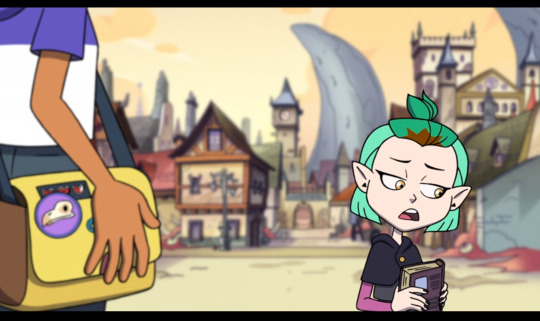
But, I titled this post The Owl House's First Reveals and I did intend to put "reveals" in plural. Because there is another character who has a side of them revealed. Eda the Owl Lady herself.

This is the episode in which we see the maternal side of Eda. Specifically, we see the lack of it. Eda is unconditionally one of the series' main parent figures. The others being Camilla, Bellos, and the Blights (Argue about Darius and Bump and whoever in the comments). But at the start of the series, she has no skill or interest in the subject, or does she? Eda takes in King and Luz on a whim, because they looked sad or in danger, and she passes that off as just something one does. The instinct is very much there, the skill? Not so much.

This episode shows Eda learning the skills of parenting. She has to put up with the babies and learn their ways in order to earn spending time with the teenagers. This is the start of Eda's arc into becoming the matron of the Owl House and the resistance later on down the line.

So, in conclusion, people are complicated. This episode sees Luz and the audience learning about the nuances of characters, even as the characters themselves learn these things about themselves.
Previous - Next
#rants#literary analysis#literature analysis#what's so special about...?#the owl house#toh#the owl house amity#the owl house luz#owl house#the owl house eda
67 notes
·
View notes